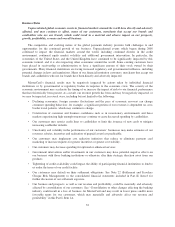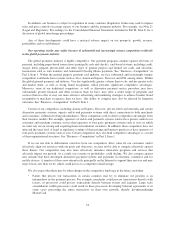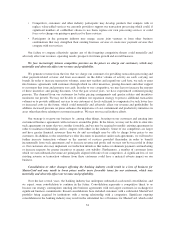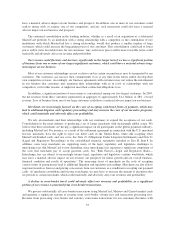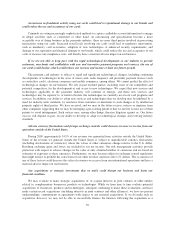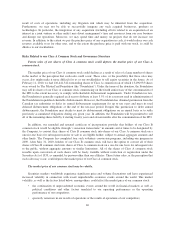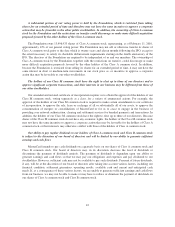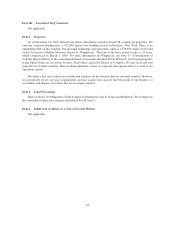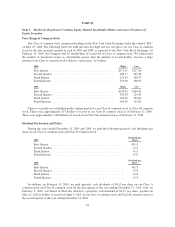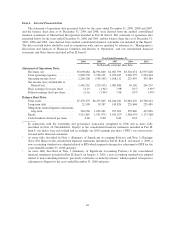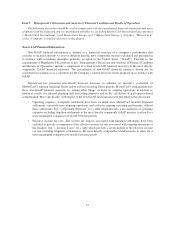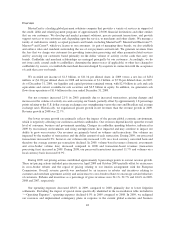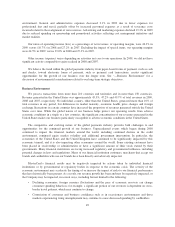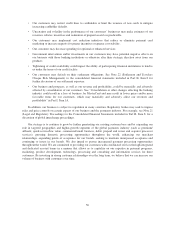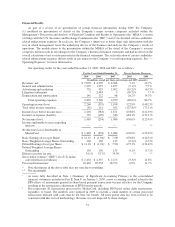MasterCard 2009 Annual Report Download - page 52
Download and view the complete annual report
Please find page 52 of the 2009 MasterCard annual report below. You can navigate through the pages in the report by either clicking on the pages listed below, or by using the keyword search tool below to find specific information within the annual report.A substantial portion of our voting power is held by the Foundation, which is restricted from selling
shares for an extended period of time and therefore may not have the same incentive to approve a corporate
action that may be favorable to the other public stockholders. In addition, the ownership of Class A common
stock by the Foundation and the restrictions on transfer could discourage or make more difficult acquisition
proposals favored by the other holders of the Class A common stock.
The Foundation owns 13,496,933 shares of Class A common stock, representing, as of February 11, 2010,
approximately 12% of our general voting power. The Foundation may not sell or otherwise transfer its shares of
Class A common stock prior to the date which is twenty years and eleven months following the IPO, except to
the extent necessary to satisfy its charitable disbursement requirements starting on the fourth anniversary of the
IPO. The directors of the Foundation are required to be independent of us and our members. The ownership of
Class A common stock by the Foundation, together with the restrictions on transfer, could discourage or make
more difficult acquisition proposals favored by the other holders of the Class A common stock. In addition,
because the Foundation is restricted from selling its shares for an extended period of time, it may not have the
same interest in short or medium-term movements in our stock price as, or incentive to approve a corporate
action that may be favorable to, our other stockholders.
The holders of our Class M common stock have the right to elect up to three of our directors and to
approve significant corporate transactions, and their interests in our business may be different from those of
our other stockholders.
Our amended and restated certificate of incorporation requires us to obtain the approval of the holders of our
Class M common stock, voting separately as a class, for a variety of enumerated actions. For example, the
approval of the holders of our Class M common stock is required to make certain amendments to our certificate
of incorporation, to approve the sale, lease or exchange of all or substantially all of our assets, to approve the
consummation of mergers or consolidations of MasterCard or for us to cease to engage in the business of
providing core network authorization, clearing and settlement services for branded payment card transactions. In
addition, the holders of our Class M common stock have the right to elect up to three of our directors. Because
shares of the Class M common stock do not have any economic rights, the holders of the Class M common stock
may not have the same incentive to approve a corporate action that may be favorable for the holders of Class A
common stock, or their interests may otherwise conflict with those of the holders of Class A common stock.
Our ability to pay regular dividends to our holders of Class A common stock and Class B common stock
is subject to the discretion of our board of directors and will be limited by our ability to generate sufficient
earnings and cash flows.
MasterCard intends to pay cash dividends on a quarterly basis on our shares of Class A common stock and
Class B common stock. Our board of directors may, in its discretion, decrease the level of dividends or
discontinue the payment of dividends entirely. The payment of dividends is dependent upon our ability to
generate earnings and cash flows so that we may pay our obligations and expenses and pay dividends to our
stockholders. However, sufficient cash may not be available to pay such dividends. Payment of future dividends,
if any, will be at the discretion of our board of directors after taking into account various factors, including our
financial condition, settlement guarantees, operating results, available cash and current and anticipated cash
needs. If, as a consequence of these various factors, we are unable to generate sufficient earnings and cash flows
from our business, we may not be able to make or may have to reduce or eliminate the payment of dividends on
our shares of Class A common stock and Class B common stock.
42


